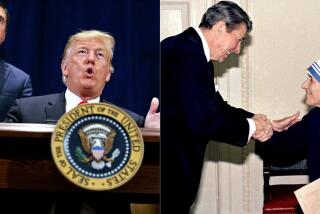Great-Communicating a Scandal
- Share via
“How are we going to recover from this one?” This was the gloomy question raised in the White House Office of Policy Development in the spring of 1987. A few months earlier, the Iran-Contra scandal had erupted, representing what conservative columnist Fred Barnes termed “the de facto end of the Reagan presidency.”
I had just joined the Reagan White House as a senior domestic policy analyst, brimming with new ideas. “What we have to do,” I argued, “is focus attention on our own substantive issues.”
Wishful thinking. As I discovered a decade ago, and as the Clinton team has come to realize, scandals take on a life of their own. Those who are part of the administration have no choice but to surf on the wave. You can deny everything or you can accept responsibility and cut your losses. Either way, the scandal becomes all-consuming.
During the Iran-Contra affair, our office promulgated several initiatives: an “economic bill of rights,” a report on the psychological effects of abortion on women and so on. We needn’t have bothered. All anyone wanted to know was, “How could President Reagan sell arms to Iran?” and “Did he know money from arms sales was diverted to the Contras?”
Today Iran-Contra is a distant memory. At the time, however, Iran-Contra had a devastating impact. Ronald Reagan’s approval rating fell from nearly 70% to around 35%, the sharpest drop ever recorded in a matter of weeks.
Reagan’s strategy in dealing with Iran-Contra was to accept responsibility for the arms sales to Iran while at the same time insisting that he had never intended to trade arms for hostages, and to deny any knowledge of a transfer of funds to the Contras.
Yet people had a right to be angry. Here was a president doing business with a regime that he himself called “Murder Inc.” One White House staffer observed that for the American people, learning that Reagan had dispatched arms to Iran was “like suddenly discovering that John Wayne had secretly been selling liquor and firearms to the Indians.”
Although Reagan maintained a brave front in public, the scandal had shattered his usual confidence. On one occasion, a White House aide asked him, “How are you going to rebuild the Reagan presidency when this is all over?” Reagan replied, with uncharacteristically grim humor, “Who the hell wants to rebuild when I’m quitting in two years anyway?”
Many of Reagan’s critics were convinced that Iran-Contra would undo his presidency. But Reagan survived. Indeed, by the time Mikhail Gorbachev came to Washington to sign the Intermediate Range Nuclear Forces treaty in 1988, the Iran-Contra scandal was subsiding. By the time Reagan left office, he enjoyed higher personal popularity ratings than any president in the second half of the 20th century.
How did Reagan recover? Most Americans were willing to look beyond the scandal because it was not done in the pursuit of power or personal gain. Reagan acted because he empathized with the sufferings of American hostages and their families and was willing to try anything to secure release of the captives. As long as there was no evidence that Reagan lied about his role in the transfer of funds to the Contras, the country seemed willing to forgive him and move on.
Bill Clinton, like Reagan, has proved to be an incredible scandal survivor. It appears likely he will even escape the impeachment hounds unleashed in the wake of the Monica Lewinsky affair.
Most Americans seem willing to overlook the Clinton scandals because this is an era of peace and prosperity. But this does not mean that people believe Clinton’s protestations of innocence. Rather, people seem worn down by the sheer multitude of scandals. Ironically, Clinton has benefited from people’s lowered expectations of his presidency. The consequence is that he is unlikely to be remembered with the fondness Americans have for Reagan. On the contrary, surveys indicate that even those who approve of Clinton’s handling of the economy and voted for his reelection also regard him with distrust, even contempt.
The lesson from Reagan during the Iran-Contra affair is that if you are a politician of conviction who makes a mistake, come clean right away and the people will understand. The lesson of today’s White House is that obfuscation and stonewalling may suppress the truth and keep the impeachment hounds at bay, but the virtually uninterrupted scandals of the past few years will define the Clinton era as a dishonorable one in the annals of American politics.
More to Read
Sign up for Essential California
The most important California stories and recommendations in your inbox every morning.
You may occasionally receive promotional content from the Los Angeles Times.













